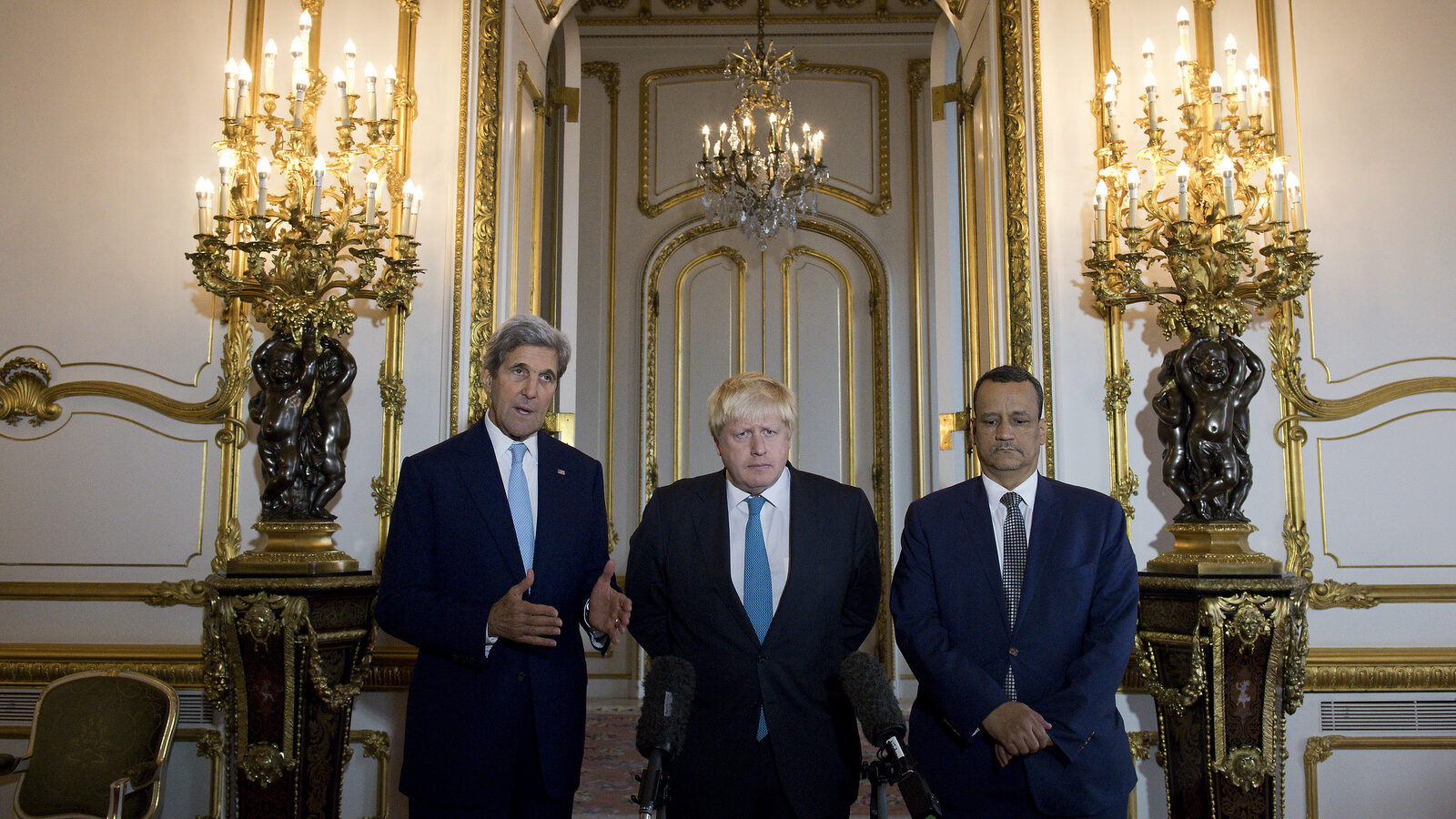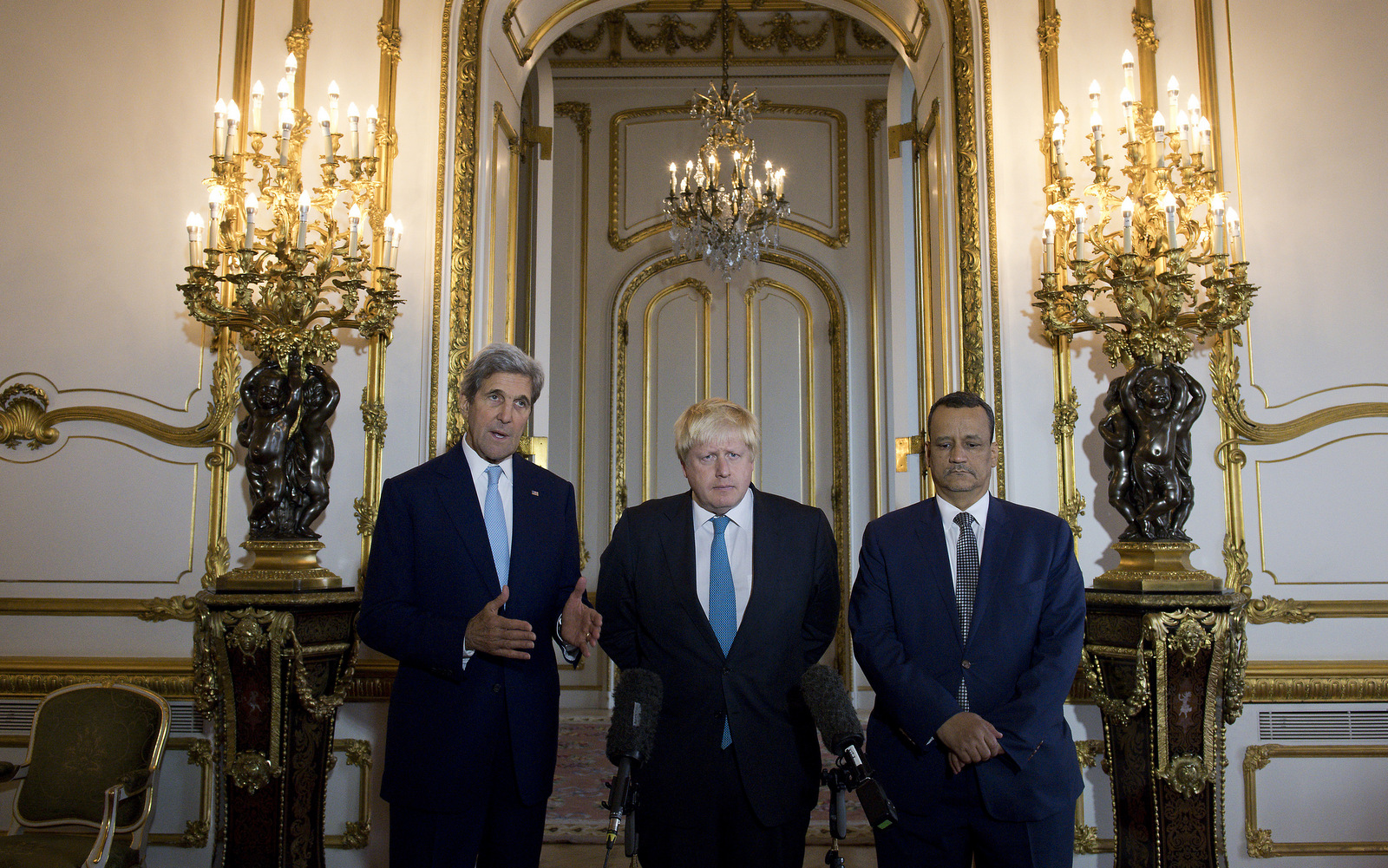
LONDON — (Analysis) As Yemen remains entrenched in the protracted, multi-fronted military conflict led by Saudi Arabia and funded by the United States, socio-political dynamics and economic realities have evolved according to the needs of competing factions — often to the detriment of civilian populations.
Since the Saudi-led coalition began dropping bombs on Yemen on March 25, 2015, 3.2 million Yemenis have been displaced and more than half of the country is suffering from food insecurity and malnutrition.
As of August, at least 10,000 civilians have been killed — that’s 13 civilians a day.
The war has taken a particularly devastating toll on children. With hundreds of thousands of schools closed, 2 million school-age Yemenis are being denied an education. In its most recent briefing on Yemen, “Struggling to Survive: Stories from Yemen’s collapsing health system,” Save the Children reported that 14.8 million people, 55 percent of whom are children, are “currently deprived of access to even the most basic health care.”
Emphasizing the human costs of war and the systematic targeting of vital civilian infrastructure, the children’s rights NGO warned:
“Yemen is in the grip of the largest humanitarian catastrophe in the world right now. 18.7 million people — including 10 million children — are in need of urgent humanitarian assistance or protections — that’s more than one third of the entire population.”
Edward Santiago, Save the Children’s Yemen director, noted:
“Even before the war tens of thousands of Yemeni children were dying of preventable causes. But now, the situation is much worse and an estimated 1,000 children are dying every week from preventable killers like diarrhoea, malnutrition and respiratory tract infections.”
Indeed, Yemen is a bleeding wound in the region, abandoned and shunned by the powers which profit most from the war waged by the Saudi-led coalition — namely, the United States and United Kingdom.

While the war on Yemen has brought a litany of suffering to Yemenis, it has also given rise to a flourishing black market. This shadow economy is tied up and firmly embedded in the terrorism inspired by Wahhabism, the dominant faith of Saudi Arabia for more than two centuries and the cornerstone of the violent jihadist movement embodied by al-Qaida and Daesh (an Arabic acronym for the terrorist group known as ISIS or ISIL in the West). It’s the nexus of terrorism which calls for the annihilation of all those who oppose its diktat.
Al-Qaida on the Arabian Peninsula, an al-Qaida offshoot of militant extremists known as Ansar al-Sharia in Yemen, has increasingly adopted the structure and behaviors laid out in Syria and Iraq by Daesh. Like so many Wahhabi-inspired terror groups, AQAP has reportedly taken its cues from Saudi Arabia, serving as a proxy of war for the kingdom and its foreign patrons.
And with a weapons industry and political blank check that feed the Saudi military complex, the U.S. corporate empire sits at the very core of such dynamics. Data gathered from the Congressional Research Service, Department of Defense Fiscal Year Series, Stockholm International Peace Research Institute, and Defense Security Cooperation Agency, revealed that the U.S. sold an excess of $100 billion worth of weapons to Saudi Arabia from 2009 to 2015, Bryan Schatz reported for Mother Jones in September.
Often overlooked by the mainstream media is the economic agenda carried out by Riyadh against its impoverished neighbor. Beyond the frenzied bombing of a nation and the systematic targeting of its institutions and infrastructure, has sat a cold determination to allow terrorist forces to usurp Yemen’s resources and capital.
The Saudi-led war on Yemen operates far beyond any military or geopolitical narrative. It’s steeped in breathing new life into the most inhumane of trades on which the Saudi economy depends: human trafficking, sexual exploitation, drugs and weapons smuggling, and Wahhabi terror financing.
Yemen has long been earmarked for complete annihilation so that the Gulf kingdom can achieve these ends.
“Behind the slaughtering of a people, Riyadh is really testing world powers’ patience and Western capitals’ propensity to rationalize genocide under such labels as ‘national security,’” Sheikh Shabbir Hassanally, a U.K.-based political analyst and commentator on Middle East affairs, told MintPress News.
The war on Yemen has become a struggle for national survival against state actors like Saudi Arabia and non-state actors like Daesh and AQAP. In this new paradigm of asymmetrical warfare driven by a neo-imperialistic agenda, the grand Wahhabist kingdom of Saudi Arabia has worked to anchor its caliphate’s economic system deep within Arabia, establishing a new, violent form of hyper-capitalistic imperialism through heinous exploitation.
‘War … is a blessing for al-Qaida’
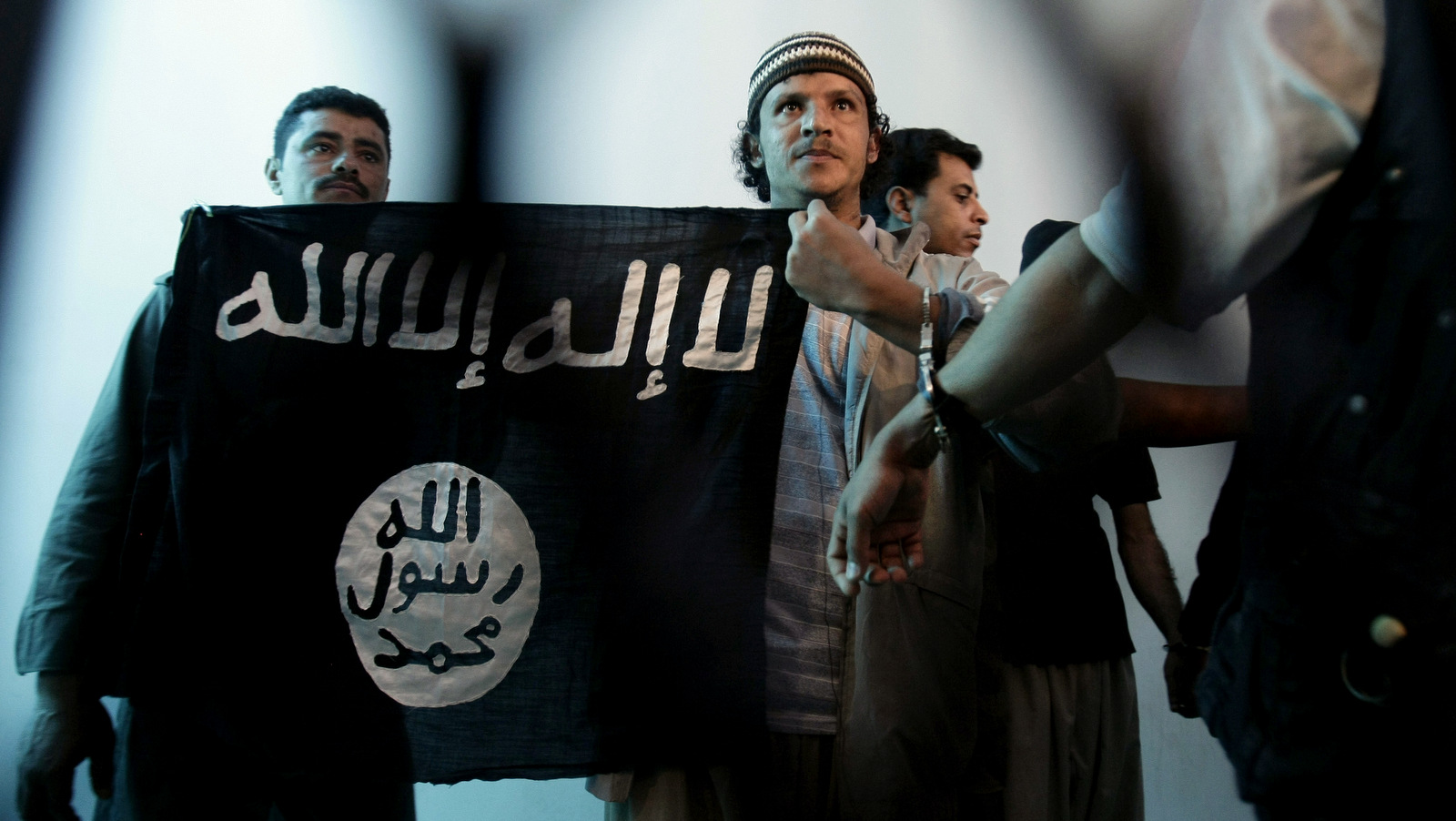
With its territorial and national identity compromised by a rising narrative of sectarianism, tribalism, and regionalism, Yemen’s descent into socio-economic, political, and even sovereign instability has empowered radical elements within its borders. Groups like al-Qaida and Daesh have found an ever-expanding space in which to live and breed.
Forced into a reactionary economy, Yemen’s resistance movement has had to withdraw behind enemy lines to find economic breathing space. From behind an iron curtain, the movement has staked its survival on the reinvention of its institutions outside the matrix of the global economy. Under siege by the Saudi-led coalition, Yemen was forced to break away and affirm its sovereign rights, as did Iran, Argentina, Cuba, and other nations targeted by imperialism’s onslaught.
Yemen’s resistance movement, represented by Ansarullah, is a loose coalition of tribal leaders, clerics, and political parties united in the rejection of Saudi Arabia’s military interventionism. It’s an umbrella for groups including the Houthis, members of the General People’s Congress (the former ruling party) still loyal to former President Ali Abdullah Saleh, as well as a slew of tribes and activists. Like Yemen itself, the movement is socially, politically, and religiously diverse.
Speaking through his office, Mohammed Ali al-Houthi, president of the Revolutionary Committee, which currently controls Yemen, told MintPress: “Out of every vacuum this war has created, it is al-Qaida and ultimately its patrons which have risen stronger still.”
He continued:
“Yemen’s war has become too much of a liability to regional stability for parties to still entertain the notion that further military entrenchment will generate positive results. War at this stage is a blessing for al-Qaida and those parties benefitting from the annihilation of Yemen’s national sovereignty. Such an eroding of Yemen’s nation-state could have terrible repercussions, since it could allow for the rise of another socio-political system – that of the Islamic Caliphate. Beyond all blame and culpability, Yemen’s biggest threat remains terror.”
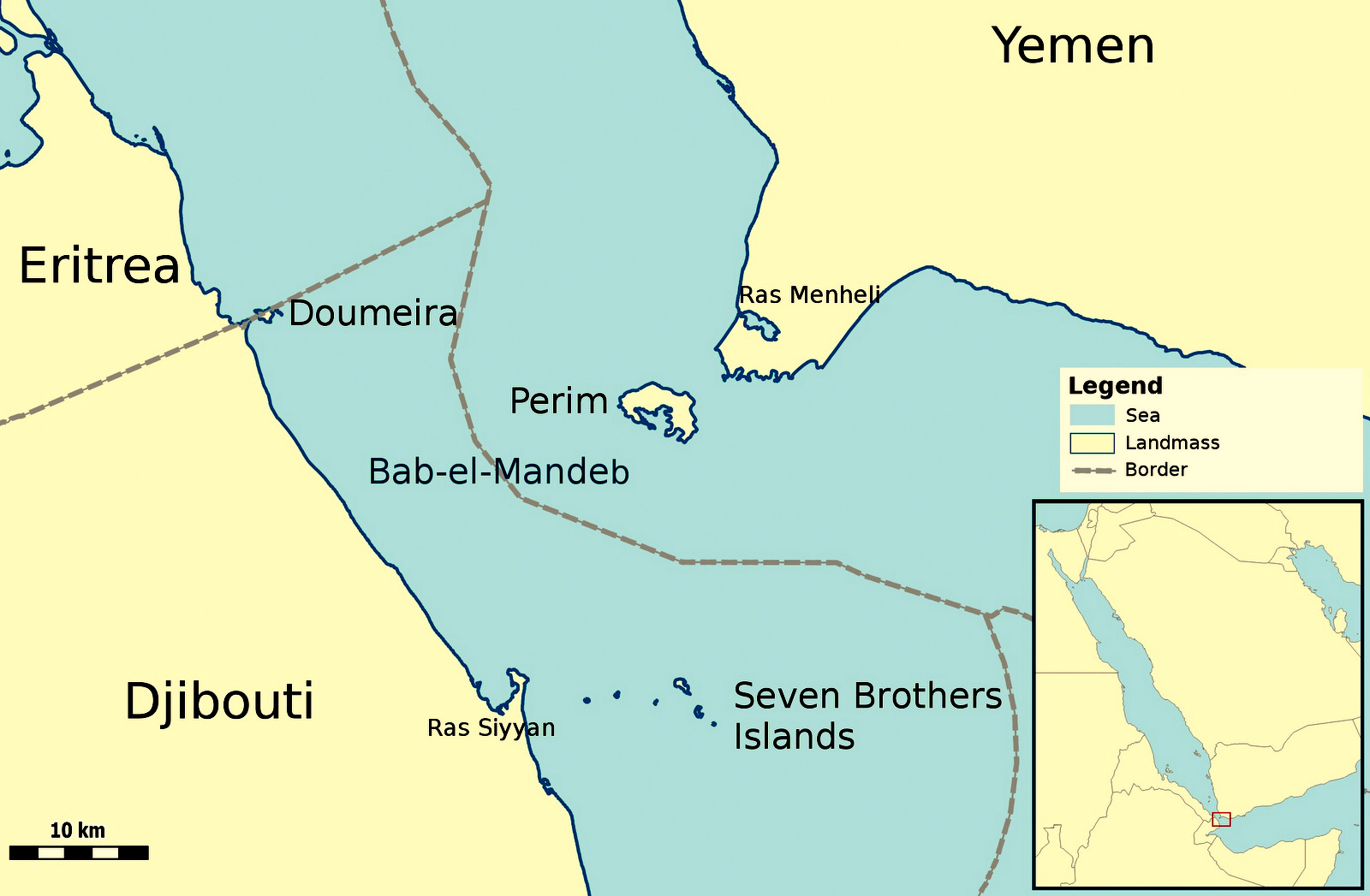
Yemen sits on Bab-al-Mandeb, the world’s primary oil route, and its waterways offer openings to Africa, Europe, and Asia, so the country on the tip of the Arabian Peninsula cannot be allowed to further fall. While assigning blame and demanding accountability are important, sovereign restoration — economic, institutional, or social — is vital.
Whether world powers have the courage to realize it or not, the Saudi leadership is attempting to institutionalize the caliphate’s black economy and breathe into existence an atrocious new financial network.
Speaking to MintPress, Sheikh Shabbir Hassanally stressed: “Yemen’s run-in with terror today is more than an ideology, it is becoming an institutional reality hungering for sovereignty — there lies a danger too great for any of us to ignore.”
“It is our ability to see through the muddied waters of imperialism and engineered terror which ultimately will determine whether we will defeat this new evil or fall under its yoke.”
Hasan al-Sa’adi, an official with the former ruling party, the General People’s Congress, told MintPress:
“While it has often been assumed that only the Houthi/Saleh complex, aka Yemen’s resistance movement, has dabbled into less than holistic activities to sustain their war efforts, careful investigating determined that while individuals within the resistance had a hand in the looting of Yemen’s sovereign economy, the resistance movement, as a whole, has proven loyal to its goal: freeing Yemen. As for those parties in league with Riyadh, their default setting has been criminality.”
Further, a certain fluidity has been observed between self-proclaimed warring factions as far as financial interests are concerned. Where very clear lines may have existed in the early stages of the conflict (individuals, tribal entities, political factions, and coalition groups sat on very distinct sides), military and humanitarian needs and an imperious desire to generate money to overpower the opposition have often led opposing sides to negotiate “access” to resources.
For example, weapons dealers based in southern Yemen, areas which are under Saudi occupation, have smuggled weapons, ammunition, diesel, and other supplies to northern Yemen via old tribal trading routes, thus betraying their alliance to resigned President Abed Rabbo Mansour Hadi, Riyadh’s patsy in Yemen.
While such activities betray immediate military interests, it appears the war has created a space too lucrative for any one party to ignore, except maybe those invested in peace.
‘Criminality has been a default setting for many of the parties involved’
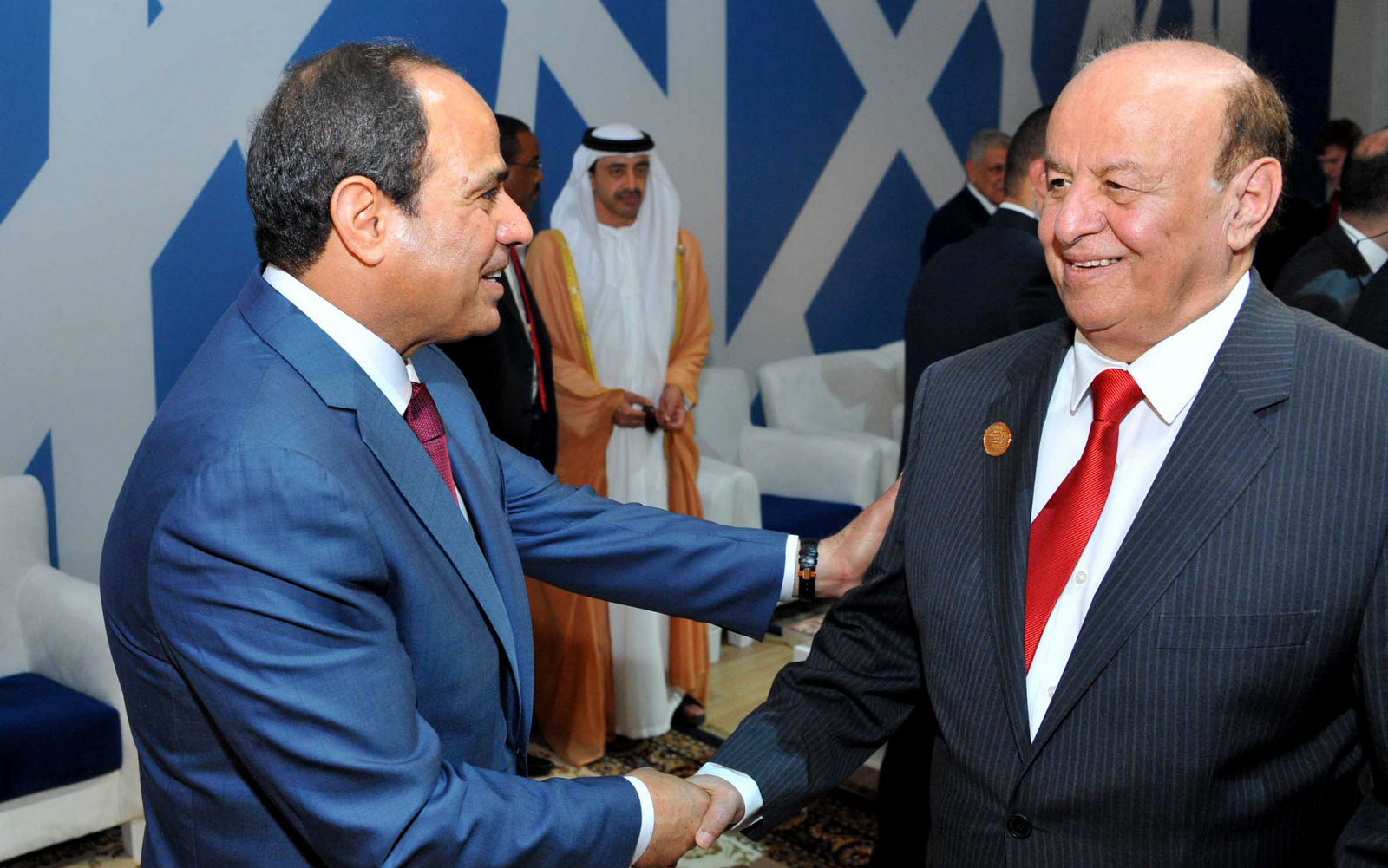
Yemen’s national economy suffered a series of crises and mismanagement well before the current chaos erupted. Yemen has not only been economically starved, its national currency been targeted so the country is unable to survive the Saudi-led, U.S.-backed war.
War has been a driving factor in Yemen’s national impoverishment, but it’s certainly not the only factor. Political factions on all sides have greatly benefited from the chaos and instability generated by the conflict, notwithstanding a widespread lack of judicial accountability. In short, this chaos allowed an already grand degree of criminality to reach new heights, elevating embezzlement into an artform.
No party can claim innocence in the race to control Yemen’s resources and institutions. Officials on all sides, at all levels, all across the country have much to answer for, as the Yemeni people have been held hostage by war capitalists and others for whom civilian interests are no matter of importance.
War profiteers, both foreign and domestic, have graced all sides and played every narrative to ensure their paydays.More often than not, malfeasance and wrongdoing have overlapped and financial interests have aligned, making it more difficult to prosecute any single party. It would be morally and legally hypocritical to hold one party to certain standards and offer another immunity on account of politics. Ultimately, Yemenis will have to decide how justice should be served.
When speaking about the crisis in Yemen, the media has focused its coverage on pitting former President Ali Abdullah Saleh and the Houthis against the renegade, twice-resigned, Saudi-backed President Abed Rabbo Mansour Hadi, who is described as the head of “the legitimate government.”
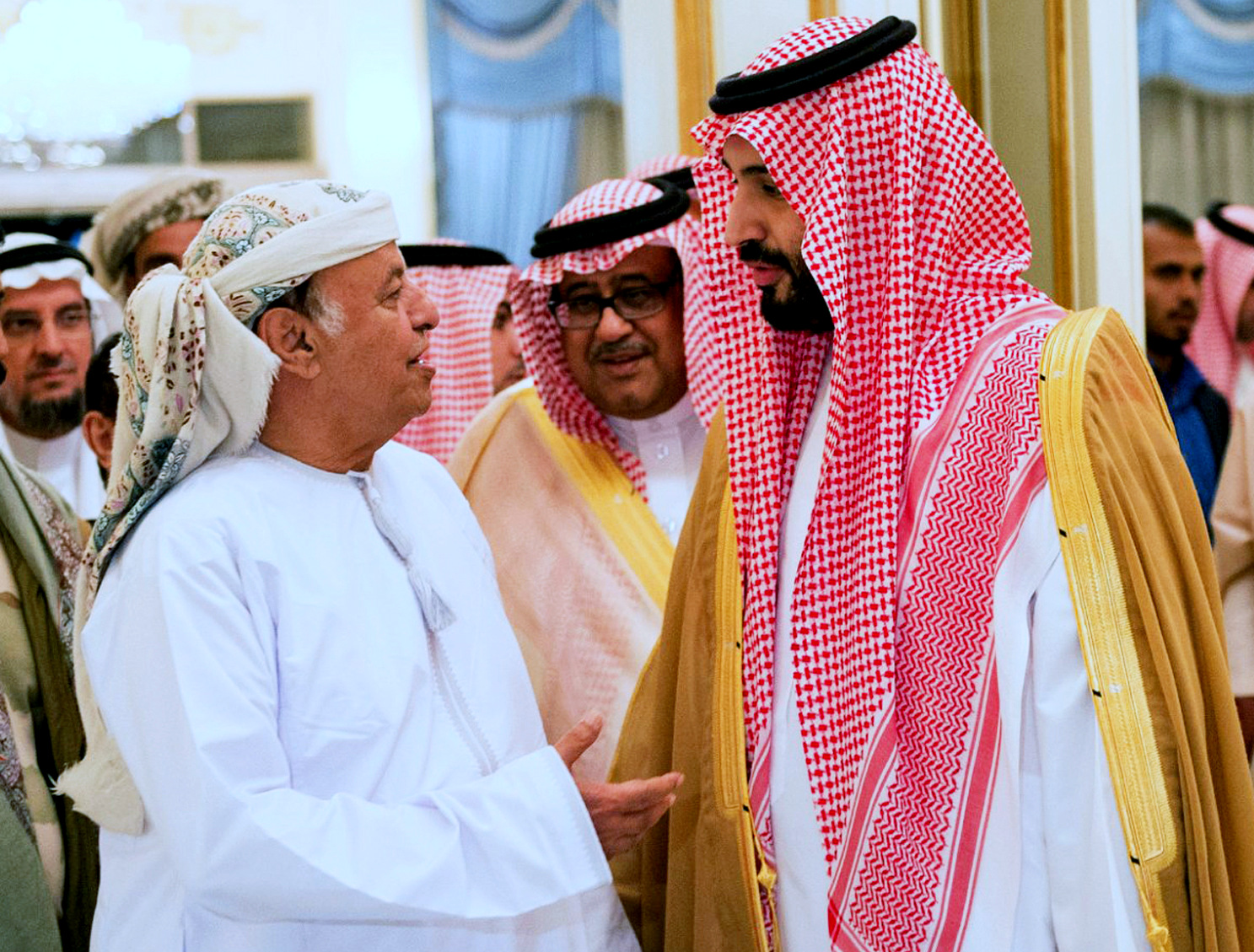
However, Kim Sharif, a lawyer and activist heading Human Rights for Yemen, told MintPress that Hadi’s claim on power “remains subject to contention as per Yemen’s customary law, one needs to stress that criminality has been a default setting for many of the parties involved.”
She further noted that if Yemen is to heal its broken institutions, closure needs to take place. But there can be no closure without some degree of justice. Yemen would need a grand political cleanse — the departure of the state, individuals, and entities who drove Yemen to its financial death — to begin anew on healthy footing.
The northern governorates of Yemen have suffered under an unprecedented liquidity crisis that has been worsening since June, following calls by Hadi loyalists for the head offices of the Central Bank of Yemen to be moved in Aden. The move, which took place in September, ambitioned to starve Yemen’s currency market and cripple the Ansarullah resistance movement — including the Houthis, in particular.
Hadi has so far escaped scrutiny, yet his financial dealings and those of his close associates demand close inspection. Often painted as a grand criminal among grand criminals, Hadi is said to have systematically dipped his hands into the proverbial cookie jars, leaving his people to starve in a landscape of fire and lead.
A former Saleh man, Hadi is in the process of recreating his predecessor’s nepotist oligarchy and building himself a fortune from behind Riyadh’s shadow bank.
All sides operate in the shadow economy, drain the national economy
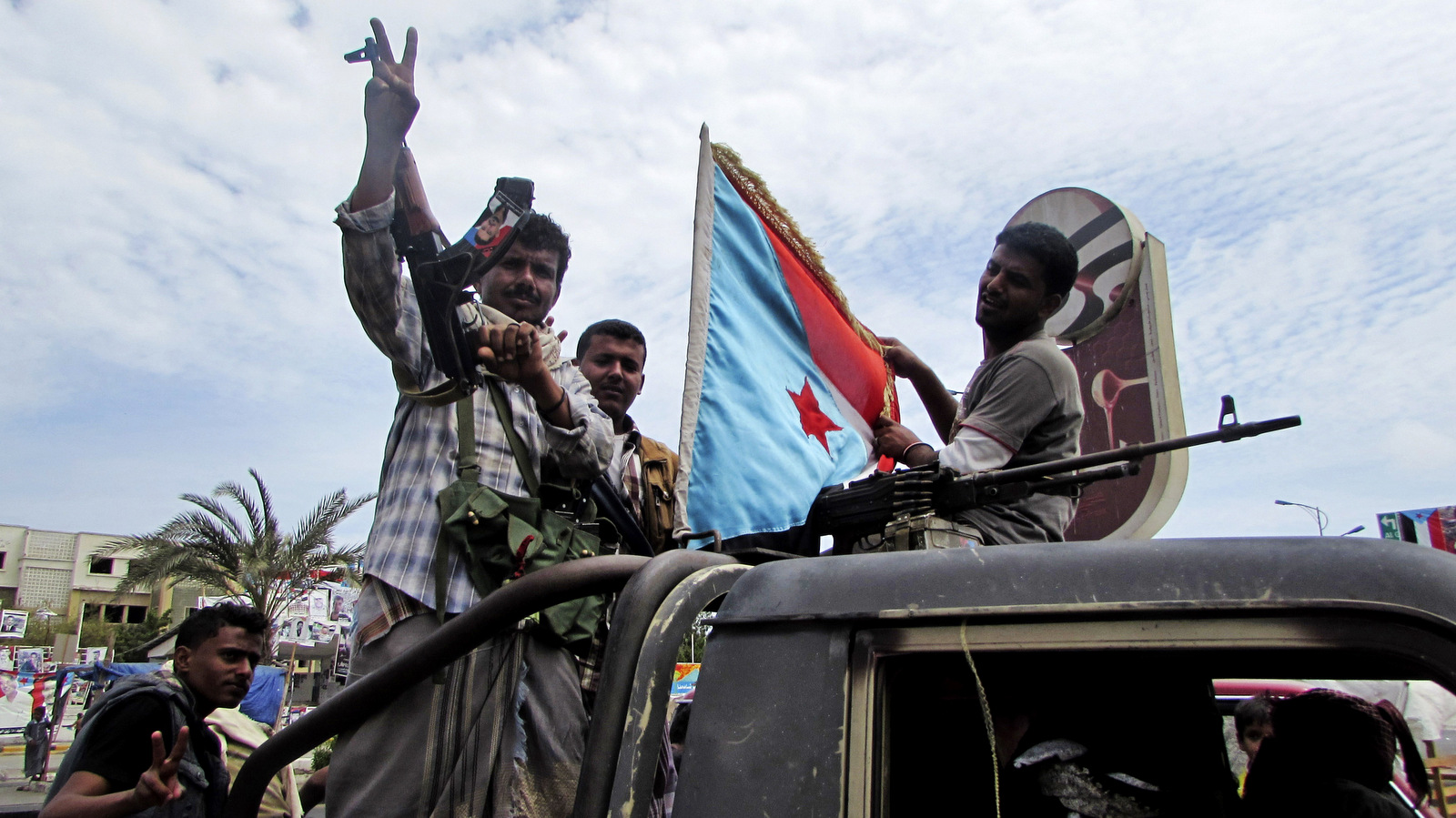
Even before Saudi Arabia declared war on Yemen in March of 2015, the Ansarullah movement was unable to sell Yemen’s oil due to a series of sabotage attacks and structural damage. And Yemen faced a security crisis posed by al-Qaida and AQAP well before the resistance assumed power over the capital, Sanaa, and by extension the running of the country.
Hadi and his loyalists have benefited from this instability. Tribal sources told MintPress that Hadi has sold several Yemeni provinces to al-Qaida in exchange for cash since the Saudi-led bombing campaign started in March of 2015. His network has amassed a fortune on the black market, dealing in weapons, drugs, and other contraband. Speaking to MintPress, Abdullah Shaban, a high-ranking Houthi officer, confirmed these allegations.
Cut off from the world oil market, the resistance turned to the shadow economy.
Yemen has a natural right to resist foreign oppression, and true legitimacy can only be rooted in popular will — a concept adherents to the notion of American exceptionalism have been keen to reject so they could better claim to exercise it.
While the resistance has syphoned millions of dollars out of the mainstream economy, it has also used state funds to run the country’s affairs — at least, as much as it could. The same cannot be said of Hadi, whose sole aim has been to exploit, loot, and disappear Yemen’s riches.
Hasan al-Sa’adi, the official linked to the General People’s Congress, told MintPress that the Houthis and Saleh first looked abroad for funding for their efforts against Hadi. Both Russia and Iran were approached as early as March of last year, shortly before Riyadh moved in against Yemen. Despite some reports in mainstream media of a proxy war set-up involving Iran or Russia, there have been no indications that any deals were reached.
Indeed, other than to offer political support, Iran and Russia have stayed out of the Yemeni theater. In the light of developments in Syria and Iraq it would be logical to assume that both powers would acknowledge it if they had any involvement in Yemen.
In December of 2015, Gareth Porter, a historian and investigative journalist focusing on U.S. foreign policy, exposed this construct when he debunked Saudi Arabia’s war narrative and the concept of an Iranian proxy war in Yemen. He wrote in Truthout:
“The allegation of Iranian arms shipments to the Houthis – an allegation that has often been mentioned in press coverage of the conflict but never proven – was reinforced by a report released last June by a panel of experts created by the UN Security Council: The report concluded that Iran had been shipping arms to the Houthi rebels in Yemen by sea since at least 2009. But an investigation of the two main allegations of such arms shipments made by the Yemeni government and cited by the expert panel shows that they were both crudely constructed ruses.”
Forging alliances despite diverging agendas
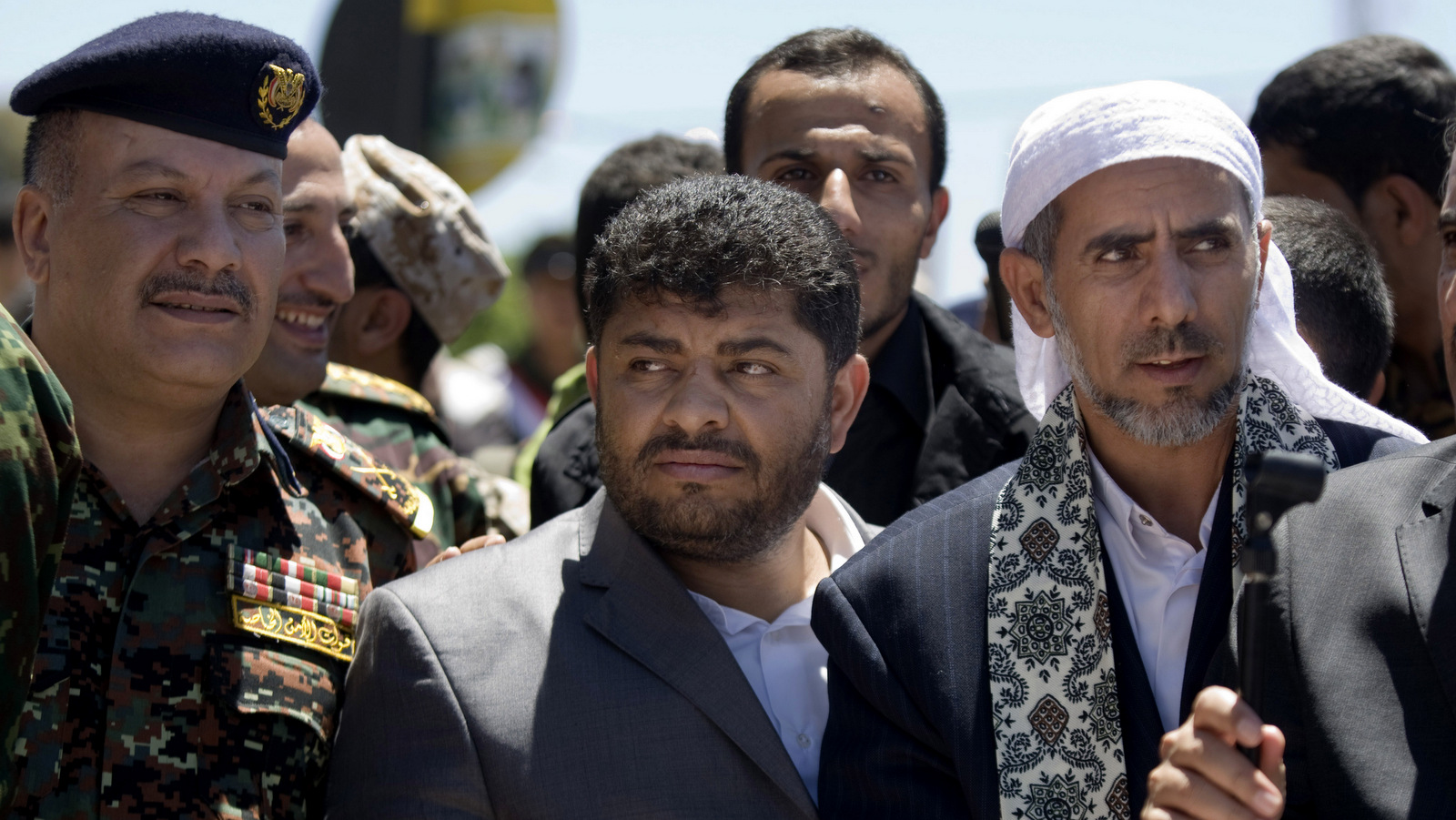
With no hope for foreign help, Yemen’s resistance took steps to fix the country’s faltering economy.
In August of 2015, Mohammed Ali al-Houthi announced a new tax of four Yemeni rials per liter on sales of all petroleum products. The tax immediately generated an estimated $237 million.
By October of 2016, 20 liters (5.28 gallons) of gasoline sold for 3,600 rials (just over $14) through legitimate sources and for as much as 7,000 rials on the black market. And since October, Abdel-Malek al-Houthi, a Houthi leader, has overseen the fuel black market to ensure that all profits are directed to the war efforts.
If the resistance has clearly played into illegal markets to generate income, the group has largely done so to sustain its war efforts against Saudi Arabia and allow for civilian life to return to some degree of normality under the humanitarian blockade. Suffocated under a punishing blockade, Yemen, which imports 90 percent of all of its food, has been starved so that Riyadh could win its colonial war.
Though accused of looting and property damage, Yemen’s resistance movement is actually a model of restraint compared to Hadi’s cold capitalistic ambitions. Where the resistance has, for example, re-routed humanitarian aid toward resistance forces to feed the war efforts and allow for fair distribution in parts of northern Yemen made most vulnerable by famine, Hadi loyalists in Aden have committed grand treason.
In the summer of 2015 residents in Aden complained that food aid was being sold to supermarkets with links to Hadi’s militias rather than distributed to the poor. Speaking to MintPress from Aden, Dr. Abdel-Mageed Kulaib said, “Whatever aid the United Arab Emirates and Saudi Arabia sent to the seaport of Aden never actually made it, as it was requisitioned by the military under strict orders from Hadi’s high-ranking officers.”
It would be wrong to look upon the Houthis and Saleh as more than an alliance forged out of political and military necessity. Despite their alliance, it’s important to note that the resistance movement and Saleh are pursuing very different agendas.
Unlike Saleh, who has reverted to his default setting of corruption, the Houthis seek to fundamentally reform Yemen and restore political self-determination to the country. They also yearn for social justice — a basic human right the former regime long denied its people. And where Saleh seeks to replenish his personal coffers with the profits of war, the Houthis and the broader resistance movement are working to ensure their political survival.
Humanitarian aid has been used by the Houthis and Saleh to create profits. In a December 2015 interview with Fatik al-Rodaini, a former journalist who now serves as co-director of the Mona Relief Organization, he explained how the NGO has established that the Houthi-Saleh complex accelerated their withholding of humanitarian aid to civilians to boost sales on the black market in the city of Taiz.
Meanwhile, Hadi has exploited his al-Qaida connections to oppose the advances of resistance troops. This allowed for AQAP to establish pockets of influence in and around Taiz as a buffer against Sanaa.
More troubling still is Hadi’s insistence on appointing al-Qaida affiliates to government positions within the territories he controls. Hadi has repeatedly shown a propensity to support AQAP in southern Yemen, using terror as a weapon of asymmetrical warfare. There, one must say, Hadi has taken his cue from Riyadh.
On Dec. 28, 2015 Hadi appointed Nayif Salih Salim al-Qaysi as governor of al-Bayda. The U.S. Department of the Treasury identified the well-known al-Qaida supporter as responsible for providing financial support to terrorist organizations in May of 2016.
“As of 2016, al-Qaysi was a senior AQAP official and a financial supporter of AQAP,” according to the statement issued by the State Department, which further accuses al-Qaysi of raising money for AQAP, delivering aid to AQAP, facilitating access through his position as governor of al-Bayda, and enabling the terror group’s expansion in the province and beyond through infiltration.
Hadi also favored another target for Treasury sanctions, Abd al-Wahhab Muhammad, aka Abd al-Rahman al-Humayqani, secretary general of al-Rashad Union, a Salafi political party with ties to al-Qaida.
His name was added to the list of al-Qaida supporters in December of 2013, around the same time that Hadi nominated al-Humayqani as a member of the National Dialogue Conference, giving al-Qaida a foothold in Yemen’s political arena. In 2015, al-Humayqani represented the “government in exile” in U.N.-sponsored peace talks in Geneva.
Here, one must discuss Taiz. The city sat at the heart of violent controversy in which mainstream media, activists, and politicians have been keen to portray the efforts of the resistance toward “breaking Taiz” as criminal, genocidal, and tyrannical.
Yet the presence of al-Qaida forces within the walls of the city has gone largely ignored. Voices echoing in the mainstream have failed to clarify al-Qaida’s ambitions of gaining a foothold in the key strategic chokepoint in Yemen. In Syria, it’s Aleppo; in Yemen, it’s Taiz.
Behind the mainstream media’s subservient peddling of Saudi Arabia’s Wahhabist agenda lies a truth few have had the courage to acknowledge, let alone internalize: the rise of al-Qaida and Daesh which Riyadh seeks to enable in Yemen.
In a letter dated Nov. 11, 2016, Brig. Adnan al-Hamadi, commander of the 35th armoured camp in Taiz, asks Hadi to approve the promotion of Sheikh Adel Abdo Faria, aka Abo al-Abas, to the rank of colonel, citing Hadi’s verbal promise to do so. Known as one of al-Qaida’s princes by Yemeni security services, Abo al-Abas was among al-Qaida’s jihadi fighters in Afghanistan.
The kingdom realized long ago that Wahhabism would need to take hold of Yemen if the Saudi elite were ever to control the whole of Arabia. To this end, the House of Saud has become a grand architect of terror, planning the death of a nation-state with total impunity.
The terror economy goes digital
Last year, sources, including the U.N. Security Council, attested to a rising trend of asset flight in Yemen through previously unidentified channels.
Facing heightened pressure from the United Nations in regards to unlawfully obtained financial holdings, members of Yemen’s deep state and militants have sought new ways to hide their transactions and holdings.
According to a forthcoming report which this writer helped to prepare for the United Nations Security Council’s Yemen Panel of Experts, al-Qaida — specifically, AQAP — has resorted to the “dark web” and the use of bitcoins to conduct several high-volume financial dealings, including cash transfers through a series of agents and shell companies. Recent scrutiny has forced al-Qaida to pursue more sophisticated technologies to prevent these transactions from being traced and their locations being uncovered.
Meanwhile, like so many average people who have turned to bitcoin instead of corporate banking and paper trails, the cryptocurrency has long been considered criminals’ preferred method for laundering money, trading in counterfeit currencies, and committing credit card fraud. In 2013, Stephen Mihm reported for Bloomberg: “Criminals, it turns out, really like bitcoins, which can be exchanged for nefarious purposes on the ‘Dark Web,’ with complete anonymity and, it seems, impunity.”
Those criminals, of course, include al-Qaida.
This writer conducted research in association with the Shafaqna News Association, an English-language Shiite news organization based in the United Kingdom, which established that al-Qaida traded weapons, precious artifacts, and drugs with bitcoin as the currency.
Once purchased, the items would be trafficked in and out of Yemen by smugglers via the Horn of Africa and Oman. Yet Yemen is under a complete blockade. As that blockade is manned by Saudi Arabia, it is safe to assume that Riyadh knows exactly what is happening. (The full findings of this report will be presented in February at the New Horizon Conference in Tehran.)
According to research conducted in association with Shafaqna and shared with the UNSC’s Yemen Panel of Experts, while the resistance has been instrumental in collecting new taxes by playing the black market to generate revenue and other schemes, it has done so to finance its legitimate war efforts against both Saudi Arabia and al-Qaida. Although it is evident that individuals within the resistance movement have abused their positions of power to embezzle funds, the resistance movement as a whole is not to blame.
Sources in southern Yemen have pointed to terrifying developments, including accusations that Hadi has been trading Yemen’s state secrets for a profit. Selling out his nation for a buck is a particular type of treachery that Yemenis will certainly have a difficult time getting over.
If such claims may seem far-fetched in that they betray an imperialistic agenda, one should note that Yemen is not terrorism’s first victim. Since grabbing hold of Afghanistan, then spreading through the Greater Middle East, terror has developed a sophisticated financial system. Syria, Iraq, and Afghanistan all attest to this reality.
Yemen is merely the newest piece of the puzzle, another cog into the terror machine.


